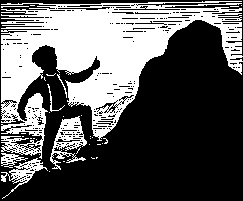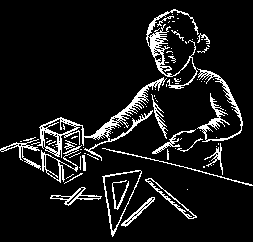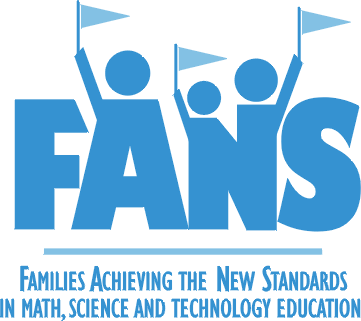WHAT CHANGES WILL I SEE IN MY CHILD'S CLASSROOM?
In order to help children reach the new standards for mathematics, science, and technology, teachers will be creating classrooms that look different from when you were in school. You will see:
Children actively involved in learning
Children will be doing things instead of just listening to the teacher. They will be performing experiments, building models, talking and working together to solve interesting problems.
Children excited by and interested in what they are doing
Children will be interested in learning, and in understanding what they are doing. As a result, they will want to learn more, and will take more challenging courses as they get older. Teachers will be asking lots of questions, and making sure that students are involved and challenged.
Children achieving at a high level

Even though the standards are high, all children will be expected to meet them. And children who can go beyond the standards will be encouraged to meet even stronger challenges.
Children working together
Children often learn better when they work together and share ideas. This also prepares them for working with others when they get jobs.
Children talking and writing
Children usually understand things better when they have to put their thoughts into words. This prepares them to explain their ideas at work, at college, and in other situations.
Children's work being evaluated in a variety of ways

There will still be short-answer tests, but children will be asked to show what they know in other ways -- by writing, drawing, working on projects, solving problems, or doing other kinds of tasks. As in the world outside of school, children are expected to show what they understand by applying their knowledge.
Children being prepared for the future
Children will learn about uses for mathematics, science, and technology in the "information age." They will learn about uses for these subjects in all careers and in their daily lives.
Children using calculators and computers
Children will use calculators and computers and other tools to get information, solve problems, and communicate with the world outside of school. By regularly using technology, they will be better prepared to use these tools in the workplace.
In math, children doing more than calculating answers
Practicing arithmetic is an important skill, but it is just a small part of the total mathematics curriculum. From kindergarten on up, children will be discovering and exploring all areas of mathematics and building up their understanding of important mathematical ideas. (For more details, see the pamphlet What Will My Child Be Learning in Mathematics?)
In science, children doing more than learning facts
Besides learning basic facts, children will be thinking about and investigating the world around them. They will be using the scientific method: asking questions, planning experiments, describing and interpreting results. (For more details, see the pamphlet What Will My Child Be Learning in Science?)
In technology, children doing more than making a product
The bridge that the child makes out of straws, for example, is important; but it is also important for the child to understand the process by which it is designed, tested, and constructed.
Children using mathematics to solve problems
In mathematics, children will be solving problems that come from ordinary situations in their lives. And in science they will be using their knowledge of math to help them with scientific investigations, with recording and understanding data, and with making scientific models.
Children using science to understand how things work
Children will start to understand the way things are related to each other, both in nature and in the world built by human beings. They will be encouraged to think of ways to improve the quality of daily life.
Children using technology to design solutions
Children will be inventing new ways to solve practical problems, like designing and building a robot to move chemicals in a factory. They will consider advantages and disadvantages of different ways of doing things, try different approaches, and evaluate the different methods. (For more details, see the pamphlet What Skills Will My Child Need for the Workplace?)
In general, when you visit a standards-based classroom, you should have the feeling that things have changed from when you were in school. Teachers will be asking children to learn different things and to learn familiar things in different ways. Both what and how children learn will be preparing them for the demands of the technologically advanced world in which they will live as adults.
